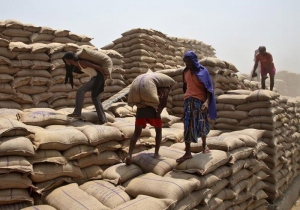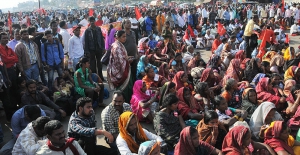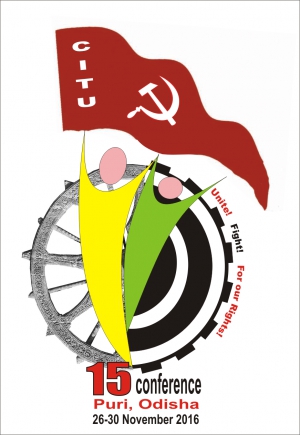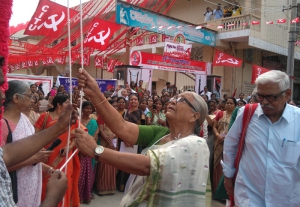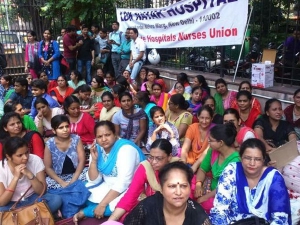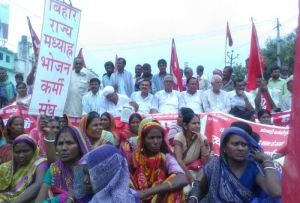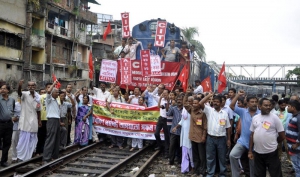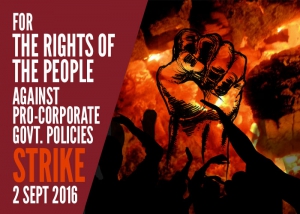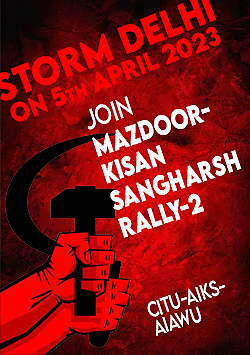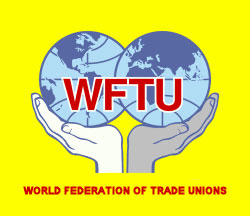Super User
A DISAPPOINTING BUDGET
1st February 2017
The Union Budget 2017-18 presented by the Union Finance Minister today in Parliament is totally disappointing and deceptive too in many respects.
The finance minister, in his budget speech, boastfully mentioned about doing away with the classification of plan and non-plan expenditure, putting entire expenditure in the same basket. Plan expenditure is meant for capital investment or expenditure for value addition either in the services or the programmes by the concerned sector/ministry, while non-plan pertains to administrative expenses. Doing away with such classification and putting the entire expenditure in the one basket is meant for confusing the people about the real extent of growth orientation.
In the background of severe economic crisis featured by massive sickness and closure of industries, resulting huge joblosses, no concrete measures are seen in the budget proposals for boosting quality employment across the sectors. Finance Minister had to admit about the gloomy situation in private investment in the domestic economy, but did not bother to take concrete measures to remove such gloom by way of increasing public investment and directly intervening to improve purchasing power of the mass of the people and, inter alia, by announcing increase in minimum wage level to at least Rs 18000/- as accepted by the central govt in the 7th Central Pay Commission recommendation. Rather the Govt did the opposite. It reiterated its ongoing exercise for privatization/disinvestment of the public sector units, who are actually keeping the economy afloat through capital investment, and also in public utility services, which would further aggravate the already prevailing income-inequality and also create more gloom in the investment scenario.
Present budget dealt on railways too, which was so long dealt by a separate budget. The Budget spoke volume on importance of Railway in the economy but did little to expand the railway network and to address safety issues in the background of alarming increase in the frequency of railway accidents. Total allocation has been increased by only Rs 10000 crore, both plan and non-plant together, making uncertain the completion of the ongoing railway projects, not to speak of new expansion initiative. On the other hand in the name of making Railway competitive, there is every possibility of further increase the burden on the people for availing railway services on the one hand and increasing privatization of railway services segment by segment.
The Budget also reiterated the continuity of its policy of disinvestment and privatization of public sector units through various route including through Exchange Trading Fund, on the one hand and closure of the sick and loss-making PSUs, even those potentially viable, on the other. This is utterly condemnable.
Although some marginal increases are made in the allocations of various central schemes like ICDS, Mid-day-meal, ASHA etc, the long pending issue of increasing the wages of scheme workers has been kept totally ignored by the Govt totally ignoring the unanimous recommendation of Indian Labour Conference. CITU denounces such arrogance.
The Finance Minister had to admit in his budget speech the reality of tax-theft by corporate and business world. He stated that “we can conclude that we are largely a non-compliant society”. But did nothing to recover the huge accumulated direct tax dues to the tune of Rs 6.59 lakh crores as per the Receipt Budget (Annex-10) presented by him. The Minister admitted on record that out of this accumulated figure, for Rs 81406 crore dues there is no dispute pending. But even that amount has not been recovered. Therefore all tall talks of transparency and tax-compliance by the Minister is a deceptive ploy to confuse people and camouflage the tax-thieves-administration nexus.
The Finance Minister spoke a lot in giving relief to the NPA-striken banks in respect of their tax liability. But maintained stoic silence in recovering the NPAs from their most favoured corporate defaulters. But the Economic Survey has brought the cat out of the bag and did not mince words in prescribing “burden sharing and even forgiving some burden on the private sector” to be done by the banks and the Govt. In essence, the entire exercise is to defend the interests of only those pilfering the national exchequer through tax-default and the banking system through loan-default, in the private corporate community.
The Finance Minister boasted about demonetisation drive as an effective measure in “eliminating corruption, black money, counterfeit currency and terror funding”. The integrity and transparency demand that the Minister should have given an account of as to how much black money could be recovered since 8th November 2016, so also on the counterfeit currency and terror funding. But no such account has been given in the budget. Rather the fact that 98 per cent of the demonetized currency has already entered into the banking system by December end clearly exposes the reality that whatever black money was there has already been allowed to be made white and nobody knows whether and to what extent the counterfeit notes got legitimized. Only mass of the people, the farmers, workers, self-employeds and small traders are made to suffer through crop-loss, wage loss, job loss and loss of livelihood. And digitization agencies like Paytm. Jeo and many others are the gainers with captive lucrative business opportunities. Question arises, the Govt for whom ?
Similar deceptive posture by Minister in the budget speech is seen when he spoke about “protecting labour rights” and referred to at the same breath the very same retrograde proposals already made by the Govt for changes in all basic labour laws; said proposals on labour-law-reforms are designed to push away majority of labour force in the country out of the purview and protection of all labour laws and to impose conditions of slavery on them. If this is not deception, then what else ?
CITU denounces such deceptive approach of the Govt towards interest and rights of the workers as demonstrated through Union Budget 2017-18 and calls upon working people to oppose and protest countrywide.
Issued by
(TAPAN SEN)
General Secretary
CITU DENOUNCES MODI GOVT’S DECISION TO MAKE WHEAT IMPORT DUTY FREE
9th December 2016
The Centre of Indian Trade Unions expresses its anguish over the retrograde decision of the Narendra Modi Govt to reduce the import duty on wheat nil as an open-ended measure and condemns such anti-farmer decision.
The decision has come at a time when the country witnessed a better monsoon and expects increase in production of wheat, which happens to be major product engaging a big section of our country’s farmers; also global price of wheat is witnessing decline.
Such measure of making wheat import duty free will open the floodgate of wheat import in our country to benefit the agro-MNCs in the background of depressed global whet price; this is going to be disastrous for the country’s agricultural sector as a whole affecting our farmers and agricultural workers in a big way.
CITU demands upon the Govt to withdraw the notification making wheat import duty free and calls upon the workers and toiling people to raise their voice of protest and opposition to such anti-farmenr, anti-people disastrous decision of the Govt
Issued by
( TAPAN SEN )
General Secretary
CITU’s 15th National Conference Concluded
The fifteenth national conference of CITU that concluded in Puri, Odisha on 30th November, gave a clarion call to build up more unity among all sections of workers and other toiling people to strengthen the struggle against the anti-worker, anti-people policies of the government at the centre.
The conference called upon all affiliated unions to organise the following countrywide movement:
- 22nd December 2016: Countrywide demonstrations of contract, casual workers along with the regular workers demanding implementation of same wage and benefits for same and similar jobs in various sectors. This will mark the beginning of a continuous movements and struggle on this issue on which the Supreme Court has also given a Judgment recently.
- · 19th January 2017: Joint rallies of workers, peasants and agricultural workers expressing support and solidarity to the demands of the peasants and agricultural Workers. This day marks the 35th year of the historic countrywide strike of the trade unions on 19th January 1982, in which the charter of demands included the demands of all sections of toiling masses. Ten persons including workers and agricultural workers were shot dead by police in various states on that day.
- · 20th January 2017: Country wide strike of all scheme workers in the country along with demonstrations at various centres on 20th January 2017 demanding that the scheme workers be given the status of workers instead of being treated as volunteers and be given minimum wages and social security benefits including pension as was recommended by the 45th Indian Labour Conference.
The inaugural session of the conference, on 26th November was addressed by national leaders of other central trade union including those from INTUC, AITUC, AIUTUC, AICCTU, UTUC and LPF. Leaders of different federations of employees and of All India Kisan Sabha, All India Agricultural Workers’ Union, All India Democratic Women’s Association, Democratic Youth Federation of India and Students Federation of India also addressed the delegates.
2023 delegates including 447 women delegates from 24 states and representing all public, private organised and unorganised sectors and various sections of scheme workers attended the conference. These delegates were elected in their respective state conferences held prior to the all India conference.
The conference discussed all important issues confronting the workers, the policies of the central and state governments, including demonetisation, the attacks on the fundamental rights of workers, social injustices and the divisive attempts of communalism.
The conference also had detailed discussion on the necessary measures to be taken to strengthen CITU as a strong country wide organisation.
Special discussions were held on impacts of globalisation, on communalism and on building untied movements of workers, peasants and agricultural workers.
New Leadership
The Conference unanimously elected Dr. K. Hemalata as President, Tapan Sen as General Secretary and M.L. Malkotia as Treasurer. Sixteen Vice Presidents including the outgoing President A.K. Padmanabhan and 16 Secretaries were elected. These 35 comrades will from the Secretariat where six are new inductions. They are M.L. Malkotia (Delhi), Dr. K.L. Karad (Maharashtra), Baby Rani (Andhra Pradesh), K. Chandran Pillai (Kerala), Meenakshi Sundaram (Karnataka), and Usha Rani (President of All India Federation of Anganwadi Workers and Helpers).
The Conference also elected a 460 member General Council including the Secretariat members which in turn elected a 160 member Working Committee.
Issued by
A R Sindhu
CITU NATIONAL CONFERENCE STARTS FROM 26TH NOVEMBER
23.11.2016
The 15th All India Conference of Centre of Indian Trade Unions (CITU) is being held in Puri, Odisha from 26th November to 30th November. The 14th Conference was held in Kannur, Kerala in April 2013.
2000 delegates including nearly 400 women elected from the State Conferences, in proportion to the membership in state, representing various sectors will attend the Conference.
The Conference is being held near Yatrika, close to the Sea beach in Puri.
The venue for the delegate conference is being named after Com. Samar Mukherji and the Conference hall is named after Com. R Umanath. Both of these veteran leaders of CITU passed away after the last conference.
Inaugural session
Inaugural Session of the Conference will begin at 10 AM with the hoisting of the CITU flag at the venue.
Conference will be inaugurated by A.K. Padmanabhan, President, CITU. The inaugural session will be addressed by Leaders of other Central Trade Unions. They include Dr. G. Sanjeeva Reddy, President INTUC, Ramender Kumar, President AITUC, Jogendranath Tripathi (HMS), Rajiv Dimri (AICCTU), Sankar Saha (AIUTUC), K.K. Panigrahi (LPF), Devarajan (TUCC), Ashok Ghosh (UTUC) and Monali Shah (SEWA).
The Conference is also being attended by a Delegation from World Federation of Trade Unions (WFTU) led by Divanitton Pereira, Member of the Secretariat of WFTU. CITU is an affiliate of the WFTU.
Mass Rally
A massive procession will begin from the Puri Railway station area by 12 noon on 26th and will culminate in a Mass Rally near Gundicha Mandir. The venue of the rally is named after K.L. Bajaj and S. Prasannakumar who were office bearers elected in the last Conference.
The Rally will be addressed by the leaders of CITU and also of the Reception Committee of the Conference.
Delegate Session
The delegate session will start from 6 PM on 26th and will conclude by 2 PM on 30th.
The report for the Conference will be presented by Tapan Sen, General Secretary and the Accounts will be submitted Ranjana Nirula, Treasurer.
The discussions on the Reports will start from 27th morning and will continue upto 28th evening. The discussions will cover various issues, confronting the workers, the struggles conducted during the last 3 years, future programmes and also about the organizational tasks of CITU.
On 29th, the delegates will be formed into 3 Commissions to discuss on Communalism, Worker-Peasant Unity and Impact of Neo-liberalism on the working people.
Concluding Session
In the Concluding Session on 30th November, General Secretary will sum-up the discussions before the reports are adopted.
The new leadership for the next three years will be elected by the delegates.
Conference will conclude by 2 PM on that day.
Seminars
The Reception Committee under the Chairmanship of Jagannath Patnaik, former President, Bar Council of India has been functioning for the last six months. State wide campaigns have been conducted. Seventeen Seminars on various important subjects have been held in different parts of the state and were addressed by various Academicians, Experts and leaders of various Trade Unions.
Three more Seminars on Agrarian Crisis and Migration, Industrial Development of Odisha, and on Tribal issues will be held on 27th to 29th at a separate venue.
Cultural programmes will be held in the Beach area in the evenings of 26th to 29th November. The venue for this, is named after veteran leader of CITU from United Andhra Pradesh Com. Parasa Sathya Narayana.
Issued By:-
(Tapan Sen)
General Secretary
All India Co-ordination Committee of Working Women
29-09-2016
The 11th Convention of All India Co-ordination Committee of Working Women (CITU) is being held at Arati Dasgupta Nagar, Guntur, Andhra Pradesh for two days, i.e., on 29th and 30th of September 2016. The venue of the Convention is named after Com Arati Dasgupta, who was one of the prominent leaders of the working class movement in West Bengal. The Convention started with the flag hoisting by Com Neelima Moita, Working Committee Member of CITU.
The presidium consisting of Comrades Ranjana Nirula (Centre), Dhanalakshmi (Andhra Pradesh), Manisha Chakraborty (West Bengal), Yamuna Gaonkar (Karnataka), V C Karthyayani (Kerala), Ida Helen (Tamil Nadu), Jaya Burman (Tripura) and Rama (Telengana) conducted the proceedings of the Convention. Sri K S Lakshmana Rao, former MLC and Chairman of the Reception Committee welcomed the participants to this 11th Convention. Com.M Girija moved the Condolence resolution.
Com.Tapan Sen, General Secretary of CITU inaugurated the Convention. In his inaugural address, he said that this Convention is a part of the organisational exercise that precedes the All India Conference of CITU that is going to be held at Puri in the month of November 2016. He also said that the report that is going to be adopted by this Convention is going to be a part of the General Secretary’s Report to be submitted in that conference. He drew the attention of the participants to the attacks that are being unleashed by the present day Modi led Central Government. He called upon the delegates to involve themselves in mobilising the workers of the country, especially the women workers against the attacks that are being unleashed by the implementation of anti-people, anti-working class policies of the Central and State Governments.
Com Hemalata, Convenor of the All India Co-ordination Committee of Working Women (CITU) placed the Report. The delegates from various States of the country are going to deliberate today and tomorrow on the report submitted.
Around 200 delegates from 14 States are participating in this Convention. Women comrades, who are the office bearers in various tiers of the CITU and women workers who day in and day out face the brunt of the anti worker policies of the rulers are participating in this Convention as delegates. Delegates from fraternal organisations viz., Insurance, Bank, Medical Representatives, Central and State Government employees are also participating in the Convention.
The conference is going to conclude tomorrow after chalking out the future course of action to fight against the ill effects of the neo-liberal policies and to strengthen the Indian Working Class movement.
HEMALATA
CONVENOR, AICCWW (CITU)
CITU DENOUNCE THE GOVT ON A SELLING SPREE OF NATIONAL ASSETS THROUGH PRIVATISATION OF CPSUs
22nd September 2016
Calls upon workers to Fight and resist Privatisation Spree of the Modi Government
The Modi Government has decided to privatise 22 CPSUs under its derogatory policy of ‘strategic sale’. The list includes the plants of Maharatna SAIL located at Salem, Durgapaur and Bhadravati, subsidiary units of IOCL, Helicoper Corporation, Cement Corporation, National Jute Manufacturing Corporation, Bharat Wagon & Engineering, Central Electronic Corporation, Burn Standard, Heavy Engineering Corporation and more. In the meantime the Government initiated steps to privatise 67 discovered oil fields of ONGC and Oil India Ltd. Sale of Land and other assets of CPSUs are also included in the disastrous move. It may be recalled that the NITI Aayog has submitted a list of 74 CPSUs to the PMO for privatisation and the list includes many profit making CPSUs. The Modi Government has incorporated in the current budget to collect Rs. 56,500 crore by selling out many excellently performing CPSUs.
The Government has declared that these onslaught against public sector is their ongoing policy. The serious dimension of the attack must be understood coupled with the Government policy of 100% FDI in almost all key sectors including Defence, Coal mining, Petroleum, Power sector, Telecom, Civil Aviation, Construction, Insurance, Banking, Railways etc. It appears, the national assets are being put on sale to private hands, both domestic and foreign.
CITU strongly opposes the mindless privatisation spree and condemn the Modi Government for its suicidal policy which will shift strategic control of the national economy to the dangerous grip of the private big businesses within the country and abroad. CITU expresses serious concern that the current move of the Government shall endanger the economic sovereignty of the country.
CITU welcomes the encouraging development of the workers launching instantaneous protest actions against the current announcement on privatisation by the Government. The workers of Salem Steel Plant staged strike action on 22nd September 2016 and the strike was total since the first shift; militant demonstrations are taking place in Bhadrabati Steel in Karnataka, Alloy Steels Plant at Durgapur and also in Rourkela Steel in Odisha. In other PSUs also, preparation for similar protests are going on.
CITU urges upon the Modi Government to take note that the 2nd September 2016 strike participated by around 18 crore workers and toiling people at the call of the Central Trade Unions of the country pressing for the 12-point Charter of Demands which also includes stoppage of privatization of CPSUs. Government must stop the privatisation move and resume dialogue with the central trade unions immediately.
CITU appeals to all trade union centres and entire public sector trade movement in particular irrespective of affiliations to immediately launch countrywide united protest propaganda, campaign and action to save public sector from the onslaught of privatisation and thereby protect the economic self-reliance and sovereignty.
Issued by
( Tapan Sen )
General Secretary
CITU DENOUNCES INVOKING ESMA ON NURSES’ STRIKE
3rd September 2016
GOVT MUST SORT OUT THE ISSUES THROUGH NEGOTIATION WITH THE FEDERATION IMMEDIATELY
The Centre of Indian Trade Unions expresses serious concern over continuance of countrywide strike by Govt Nurses under the leadership of of All India Govt Nurses’ Federation since 2ND September 2016 with the Govt of India indulging in complete inaction in sorting out the long pending demands of the Nurses of Central Govt Hospitals. As many as 20000 nurses of Govt Hospitals including those run by MCD have joined the strike. The demands are related to pay and allowances of the Nurses for which the Federation have been pursuing since long and they have been given concrete assurances by the Govt based on which the strike was deferred at least twice. But the assurances have not been implemented.
The CITU is dismayed over the inaction of the Govt on the vital demands of the Nurses, serving in the most sensitive sector thereby creating a situation of stalemate. CITU also denounces invoking of ESMA against the striking Nurses instead of taking meaningful initiative for settling the issues with their Federation through negotiation.
The CITU demands upon the Govt to withdraw ESMA on the striking Nurses and initiate dialogue with the Federation for sorting out their long pending issues amicably and ending the stalemate.
Issued by
( TAPAN SEN )
General Secretary
2nd September 2016 General Strike – Reflection of Workers’ Anger
The country wide general strike on 2nd September this year was even bigger and more widespread than that held on the same day last year, as initial reports from all over the country suggest. The country wide general strike this year too was held on the same 12 point charter of demands. The central trade unions claimed a participation of 15 crore workers in the strike last year. The impact of the strike this year was so huge that even before the trade unions made any claims, the electronic media reported that 18 crore workers participated in the strike.
This gives big rebuff to the claims made by the government that it was working for the benefit of the workers and for providing them social security benefits. It is also significant that the BMS, which withdrew from the strike in the last minute in 2015, did not join the strike call this year at all. Besides, the BJP led government used everything within its capacity to create confusion among the workers and sabotage the strike. The BMS became a willing ally of the government in these efforts, declaring that it was ‘withdrawing’ from a strike that it has never called, but also claiming ‘historic victory’ for the workers. All these were nothing but manoeuvres by the BJP and the BMS, both members of the same parivar headed by the RSS to deceive the workers in their efforts to serve their corporate masters. The corporate media, particularly the electronic media, as usual, aired these false claims and added their might to the misinformation campaign.
But the working class of the country refused to be deceived. As the reports show, despite the call of the BMS leadership to organise ‘victory rallies and meetings’, BMS members were not willing to oppose the strike. In fact, in several places they joined the strike. Workers who were not organised into any unions, who joined the strike last year, as in Pune industrial area, joined the strike this time too. In several places the strike spread to newer areas encompassing newer sections of workers. In many states, not only the states that are traditional strongholds of trade unions, but in many others, the strike turned into a bandh. This was mainly due to the massive participation of the road transport workers as a result of which life in these states came to a standstill. In many districts of Assam, Bihar, Haryana, Jharkhand, Karnataka, Madhya Pradesh, Odisha, Punjab wore a bandh like look. Despite the attempts by the TMC government in West Bengal to suppress the strike by issuing warnings and threats to the workers, state transport buses in the state plied empty and a bandh like situation prevailed in almost all the districts. In Kerala and Tripura, as always, strike turned into a bandh.
The anger of the workers against the policies of the government was visible in many ways. Around 70000 anganwadi employees and ASHAs, most of them who were not members of any union joined the strike in Gujarat. Thousands of them participated in the demonstrations held at the district headquarters in many districts. All the workers in the minor ports of Bhavnagar in Gujarat, Gangavaram and Kakinada in Andhra Pradesh joined the strike. These workers are not members of any of the central trade unions that called the strike. Similarly in many industrial clusters across the country, thousands of workers, who are not members of any union, joined the strike.
While there were a few areas like the port sector where the strike was not as good as the last time, and a few districts where the strike in the road transport sector was not as effective as last year, overall the strike was observed in many more industrial clusters and sectors and many newer sections of workers joined it.
It was not only the misinformation and misleading campaign of the government with its huge advertisements in the media aided and abetted by the BMS that the workers confronted. In several states they were subjected to victimisation, police repression and physical attacks. In Haryana 22 leaders of road transport workers’ union were arrested and the striking workers were lathi charged; police went to the residential areas where contract workers lived and coerced them to join duties. Several coal workers in Jharkhand were suspended for joining the strike. The police conducted a flag march to intimidate workers and also lathi charged workers standing peacefully near a theatre in Noida. In West Bengal CITU leader and former MP Suraj Pathak and many CITU leaders were arrested. TMC goons attacked the workers and their supporters, including women, participating in the rallies. Around 5000 workers were arrested in different parts of Assam.
The extent of the strike and the support it received could be gauged from the reports that were available till the evening of 2nd September though comprehensive reports from all the states and sectors are yet to come. In several states local state level unions joined the strike. In Telangana, the TRS affiliated union joined the strike; the TNTUC belonging to the ruling TDP in Andhra Pradesh supported the strike in Telangana. Even in Vijayawada in Andhra Pradesh, though TNTUC opposed the strike, workers belonging to it joined the strike. In Odisha the chief minister himself expressed his support to the strike when the trade union leaders met him. The Left parties openly supported the strike. Even while the BMS was not part of the strike and BMS leadership directed its members to observe ‘victory rallies’, local units of the BMS were not in a position to oppose the strike; in several states BMS members joined the strike.
Overwhelming majority of bank and insurance employees all over the country joined the strike. State government employees in most of the states joined the strike. Particularly noteworthy is the participation of state government employees in the north eastern states including Arunachal Pradesh, Manipur, Mizoram, Nagaland, Meghalaya etc who participated in the strike for the first time. Participation of central government employees – of the income tax employees, postal employees in particular was massive. Defence employees in several defence production units joined the strike. BSNL employees all over the country joined the strike. The strike was near total in the coal sector. Overwhelming majority of contract workers in the public sector participated in the strike. Strike among medical and sales representatives was total in almost all the states.
Scheme workers including anganwadi employees, ASHAs, midday meal workers participated in the strike all over the country. Teaching and non teaching staff of National Child Labour Project joined the strike in Bihar, Maharashtra etc. Traditional sector workers like the plantation workers, cashew, coir, and fisheries workers participated in the strike in their lakhs. Unorganised workers in beedi, construction, head load workers, auto and rickshaw drivers, street vendors, domestic workers in several states joined the strike and also participated in the demonstrations, rasta roko and rail roko. Municipal and conservancy workers, panchayat workers, village chowkidars etc also joined the strike.
In Andhra Pradesh, strike was total in Vizag steel and DCI; around 70% of workers of permanent workers in the Vizag Shipyard participated in the strike. The TTD in the holy town of Tirupati was totally paralysed. Autos all over the state went on strike. Almost all the industrial clusters including the Renigunta industrial area were closed down. In several major cities truck owners associations participated in the strike. This along with the strike of the head load workers throughout the state brought all commercial transactions in the state to a standstill.
In Assam strike took the form of complete bandh in almost all districts seriously affecting public and private transport. No oil refinery in the state functioned. ONGC remained paralysed. More than 15 lakhs tea garden workers joined the strike. All public and private educational institutions remained closed. Railway transport was disrupted due to the rail roko by the unorganised workers, peasants, agricultural workers etc.
In Bihar too the strike was turned into bandh in many districts. Road transport including bus and tempo services was off the road. Workers in several industrial clusters went on strike.
Workers in almost all the major industrial areas in NCR Delh joined the strike. Massive joint demonstrations were held in several centres. The central demonstration was addressed by the national trade union leaders.
In Gujarat, an estimated 4 lakhs workers in 22 districts joined the strike and organised demonstrations in many districts.
Strike was highly successful in Haryana including in the Gurgaon, Manesar industrial areas. Workers in the Manesar plant of Maruti Suzuki, Honda, Hero Honda and other industrial units joined the strike and held demonstrations.
Demonstrations were held in Jammu region in support of the strike while Kashmir region continues to be under curfew. Thousands of workers from different sectors participated in the demonstrations
In Jharkhand strike was observed in industrial areas including in Jamshedpur that never participated in any strike till now. It was reported to be more massive than the strike in 2015.
An estimated 50 lakhs workers participated in the strike in Karnataka. Strike was total in the road transport sector and in all the major industries in Bengaluru and Mysore. 19 lakhs workers in the industrial clusters of Bengaluru joined the strike. Strike was total in both the units of Mico, L&T, Chenna metals, Toyota, ITC, Vikrant Tyres etc. In BEL in Bengaluru, the union affiliated to INTUC did not join the strike; despite this 80% of workers, 800 out of the total 1073 workers, more than the membership of the CITU affiliated union, joined the strike
The strike in transport sector in several cities and towns in Madhya Pradesh was total. Hamalis of agricultural mandis also participated affecting commercial transactions.
Strike was total in many private industrial areas in Maharashtra including the Pune, Aurangabad, Nagpur, Nasik, Mumbai, Solapur etc. Major industries like Ceat Ltd, Thysun Crupp, Sansonite India, Crompton Grieves, beer manufacturing units, pharma industries, liquor and textile industries were closed. Strike was total among beedi and power loom workers in Solapur.
Strike created a bandh like situation in Odisha. It was total among iron ore, manganese and coal mines workers and near total among the contract workers. Road transport including autos was totally paralysed.
Strike evoked massive response in Punjab with workers. Road transport was paralysed and industrial clusters remaining closed. Unorganised workers participated in the demonstrations in thousands.
The garment industry in Tiruppur in Tamil Nadu witnessed total strike. Strike was also effective in the Coimbatore industrial area. It was total in Ashok Leyland, Ennore Foundries, Simpson Group of companies and all three factories of TI Group in Chennai. Workers in BHEL Trichy and Ranipet, ordinance factory in Nilgiris, defence production units in Avadi and Aravangadu were totally in strike. In Aravangadu, BMS members also joined the strike. Contract workers in Manali industrial belt MFL, ATC Tyres in Tirunelveli and TCL Lancer, in L&T, in Tyre machinery making Honey Well company went on strike.
There was bandh like situation in the state due to the total participation of road transport workers in the strike in Telangana. There was total strike in most of the public sector undertakings in the state. Strike was also total in most of the industrial clusters in and around Hyderabad. On the whole the strike was reported to be even more successful than last year
Strike was total in Udhampur industrial area of Uttarakhand and partial in that in Haridwar. It was also total in public road transport in the state but partial in private road transport.
In West Bengal, bandh like situation prevailed in many districts despite the threats and intimidation of the TMC government and its goons. Government ran buses without passengers in the morning but was compelled to withdraw later. Jute mills were closed. Commercial activities were nominal. Educational institutions in several districts were closed. Most of the tea gardens remained closed.
This strike, the seventeenth joint country wide general strike after the advent of neoliberal policies in the country, was preceded by joint campaign that was better organised and taken up to the block and in some states lower level to reach the workers. In addition, CITU prepared campaign material to make the workers aware of the issues and their relationship to the government policies. Booklets exposing government claims were also published which were translated into local languages. During the strike the lower level committees were regularly up dated with information exposing government claims. This has helped in preventing the workers from succumbing to the confusion sought to be created by the government and the BMS.
This country wide general strike will definitely be a mile stone in the working class struggles of the country.
Hemalata
Historic General Strike: CITU Salute the Working Class of India
2nd September 2016
The Centre of Indian Trade Unions salutes the working class of India for the historic strike today rebuffing all attempts by the BJP led NDA government to confuse the workers through different channels.
This was the biggest ever strike by the working class of the country with some media channels reporting that 18 crores workers joined the strike with its sweep much beyond the workers organised by the sponsoring trade unions. Employees and workers from all sectors of the country’s economy – organised and unorganised, public sector and private sector, central and state government departments, and the scheme workers participated in this strike. In all the strategic sectors of the economy, viz., coal and non-coal mines, electricity, Engineering, petroleum, defence production, telecom and the financial sector like banks and insurance etc, the workers and employees took part in the strike in a big way ignoring threats of the respective ministries, managements and also by many state governments. State level trade union centres also joined the strike in several states including Telangana, Tamil Nadu, Odisha etc. It is significant that this general strike called by all the central trade unions except the BMS and almost all independent federations of workers and employees received unprecedented support from the common people. Peasants, agricultural workers, youth, students and women joined in large numbers in the rasta roko, rail roko and the demonstrations held across the country, in support of the demands raised by the trade unions.
Workers actively participated in the strike despite the use of state repression including the use of police force in some states like West Bengal, Haryana, Uttar Pradesh, Assam etc. The Trinamool government in West Bengal used the brutal force of its police as well as its goons to physically attack the workers on strike. There were clashes in several districts as workers resisted the use of force. Section 144 was imposed in several industrial areas as in Gurgaon, Faridabad in Haryana, Nodia etc. 12 workers of Maruti Suzuki and 22 transport union leaders were arrested in Gurgaon; police went to workers’ residential areas in Gurgaon to coerce contract workers who were on strike, to join work. The West Bengal transport minister directed the MD of Water Transport to suspend the striking employees. TMC goons attacked processions of striking workers, youth, women and even journalists in Burdwan and many other places.
Road transport came to a standstill in several states including Haryana, Punjab, Telangana, Karnataka, Assam, Odisha, Kerala, Tripura etc. Autos too were off the streets in several states like Andhra Pradesh, Odisha, Karnataka etc. Though the trade unions did not call for a bandh, a bandh like situation prevailed in many states in the country including Assam, Bihar Haryana, Odisha, Kerala, Tripura, Telangana, many districts of Karnataka, Madhya Pradesh and others. Large industrial clusters and manufacturing hubs in most of the states including Andhra Pradesh, Assam, Delhi -NCR, Haryana, Odisha, Punjab, Tamil Nadu, Telangana, Uttar Pradesh, Karnataka, etc came to a grinding halt due to the strike. Lakhs of workers in the industrial areas of Pune, Aurangabad, Nagpur, Nasik, Mumbai and Solapur in Maharashtra joined the strike enmasse. The strike was total in Kerala and Tripura.
The unprecedented response to the strike, despite the misinformation campaign unleashed by the BJP government aided by BMS, reflects the anger and resentment of the workers against the attacks on their working and living conditions by the neoliberal agenda of the BJP led government.
This strike is yet another warning by the working class of India that it is determined to continue its struggle to protect not only the rights of the workers but also the self reliance and sovereignty of the country.
The CITU extends its gratitude to the massive support and solidarity extended to the strike by various sections of the people including kisans, agricultural workers, adivasis etc.
CITU demands the government to take immediate steps to meet the demands raised unanimously by the entire trade union movement in the country. It calls upon the working class to further strengthen the unity at the grass root level and be prepared for more intense struggles if the government chooses to continue with its policies.
Foil the Conspiracy to Sabotage the Countrywide General Strike : STRIKE IS ON
1st September 2016
The Union Labour Minister, Shri Bandaru Dattatreya had sent a release to Media and press on 31st August 2016 at 9 pm trumpeting on “NDA Govt’s commitment to fair earnings and social security for the workers.”
CITU considers this statement a deliberate “misinformation campaign” to create confusion and to sabotage the countrywide general strike on 2nd September 2016, which all sections of workers and employees have already prepared to join.
The Labour Minister claimed to have announced a 42% rise in minimum wage for the workers in central sphere. What does that mean for the workers and the unions who have demanded fixation of statutory minimum wage for all workers in the country at not less than Rs 18000/- per month? This means that minimum wage for workers in the “C” category areas should be at least Rs 18000, making it proportionally higher in “B” and “A” category areas, i.e., Rs 22320 and 26560 respectively. The government’s offer of Rs 9100/-, Rs 11362/- and Rs 13598/- respectively for the workers of central sphere in “C”, “B” and “A” category areas respectively is not even half of what all the central trade unions including BMS unitedly demanded and have been pursuing since last five years; they vociferously argued for the same on the latest occasion in the meeting of the Minimum Wage Advisory Board held on 29th August 2016. How could a trade union worth its name accept such a mockery on their genuine demand formulated on the basis of a formula accepted by the central govt also? BMS may consider this mockery of offer a “historic achievement” owing to their compulsion, but others cannot.
And who is going to be benefited by this offer. This offer is for the workers in the central sphere which as per Minister’s own estimate is 70 lakh. This will not benefit even one per cent of the non-agricultural workforce in the country, if at all it is implemented. For 99% plus workers of the country this offer means nothing at all. Does the minister have any answer for them?
The trade unions had been all along demanding for a statutory binding arrangement for Minimum Wage applicable throughout the country. Making noise over some marginal increase, that too for the extremely minority section of workers in the central sphere is aimed at deceiving the overwhelming majority of the workforce.
Hon’ble Minister announced that the Govt will pay the employers contribution in provident fund and pension for three years. Why should the national exchequer pay for employers’ statutory liability toward PF and pension? But this is a government that has been allowing the corporate to pilfer national exchequer by not paying due taxes (Rs 5 lakh crore), indulging them not to pay back loans taken from banks (Rs 8.5 lakh crore); they are also paying the employer the cost of training the apprentices partially, and now the Govt has decided to shoulder employers’ statutory liability toward PF and pension for three years not from their own pocket but from the national exchequer. What else can be called loot on national asset? Claiming these anti national measures as ‘commitment to national development’ is nothing but hypocrisy.
CITU asserts that this kind of gimmickry will not deter the workers of the country from their struggle. THE STRIKE IS ON
(TAPAN SEN )
General Secretary

